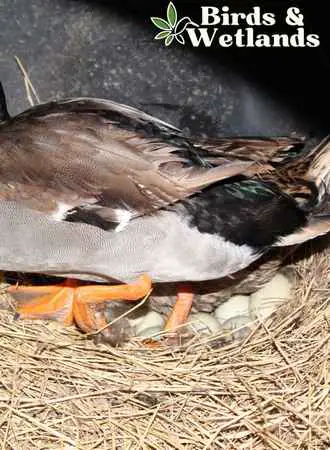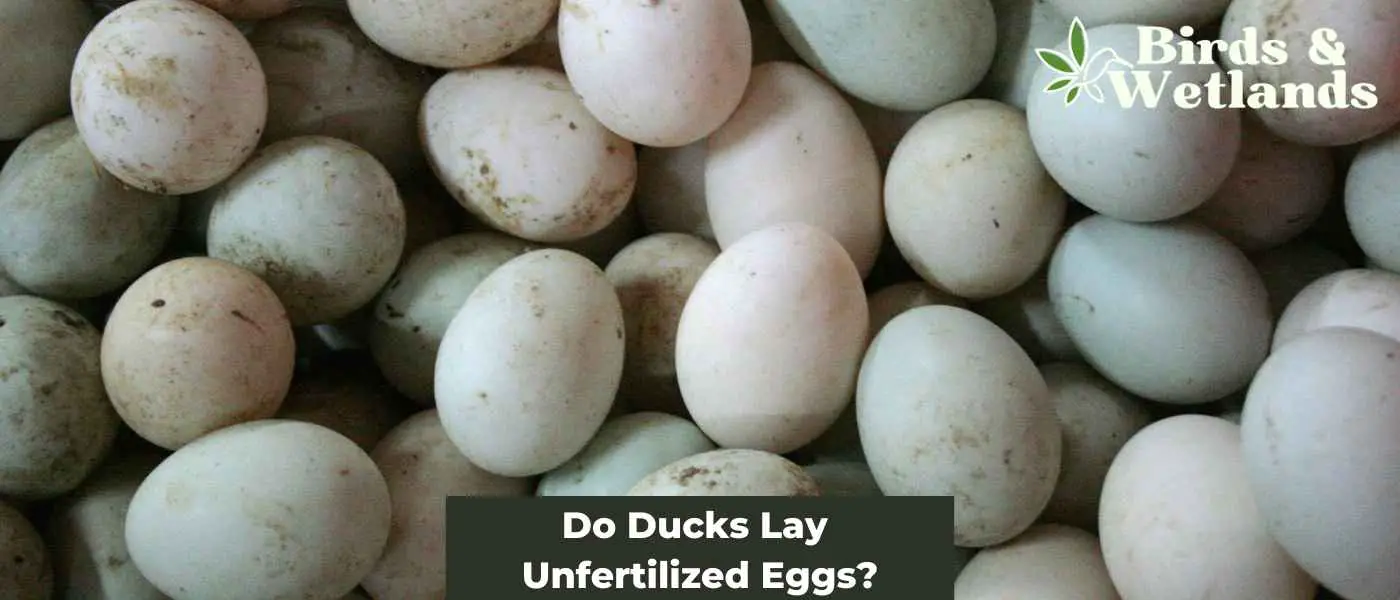Yes, ducks, like other birds such as chickens, can lay unfertilized eggs. This process doesn’t require the presence of a male. The laying of eggs is a part of a female duck’s natural reproductive cycle, and she will typically lay eggs whether they are fertilized or not.
However, these unfertilized eggs will not develop into ducklings. The only way for an egg to be fertilized is for the female duck to mate with a male duck before or during her laying cycle.
Key Takeaways Ducks Laying Unfertilized Eggs
- Female ducks can lay eggs without a male, but these eggs will be unfertilized. A male duck is necessary for fertilization, which leads to hatching of ducklings.
- Domestic ducks, selectively bred over thousands of years, are more prolific egg layers than wild ducks. They can lay an egg every 24-48 hours, starting from 6-7 months of age.
- There’s no nutritional difference between fertilized and unfertilized eggs. The key distinction lies in their genetic makeup and potential to hatch. Proper storage is essential to avoid possible Salmonella contamination.
- Determining whether an egg is fertilized can be done through prediction (if drakes are present), candling (inspecting the egg with a light source), or breaking the egg and checking for a small white spot in the yolk.
- Ducks are social creatures that benefit from companionship. If possible, it’s recommended to provide a male duck companion for the comfort and happiness of female ducks.
How Often Do Ducks Lay Unfertilized Eggs?
Nesting waterfowl can produce one egg every 24 to 48 hours. On average, a female duck will lay between 30 and 40 eggs over the course of her nesting season.
But this depends on her breed or species. Not all of these eggs will are fertilized. In fact, it is not uncommon for a female duck to lay several unfertilized eggs.
A duck will sit on infertile eggs for about 28 days before giving up. If the eggs are fertile, the duck will continue to incubate them until they hatch.
Woodlink Cedar Duck Nesting Box
Attract ducks to your wetland area and provide them with a cozy, secure nesting space using the expertly crafted Woodlink Cedar Duck House, made with high-quality materials in the USA.

Pros
- Ornithologically designed: This nesting box is specifically created for ducks, ensuring an optimal environment for them to thrive.
- High-quality materials: Made from re-forested, kiln-dried, inland red cedar, the Woodlink Cedar Duck House is both durable and eco-friendly.
- Easy to install: The nesting box comes fully assembled, with screws included for quick and easy mounting.
- Made in the USA: Take pride in knowing that you are supporting a product that is made domestically, ensuring top-notch quality and craftsmanship.
- Versatile use: While designed specifically for ducks, this nesting box can also be occupied by other species like screech owls, squirrels, and pileated woodpeckers.
Cons
- Mounting height: Users must research and choose the appropriate mounting height (usually 4-6 feet above the ground) and install a baffle on the post to deter predators like raccoons and cats.
- Limited viewing access: Although the front of the box can be opened for viewing, it is important not to disturb nesting birds, which may limit opportunities for observation.

How Long Is the Incubation Period of a Duck Egg?
The incubation period of duck eggs is around 28 days. The ideal temperature for keeping duck eggs is between 99 to 99.5 degrees Fahrenheit. Moreover, maintain humidity levels at 65-70%. If the conditions are not optimal, it will result in a lower hatch rate.
Once the ducklings have hatched, they must be kept warm and dry. A brooder box with a heat lamp is ideal for this. The temperature inside the brooder should be 95-100 degrees Fahrenheit for the first week, and then it can be lowered by five degrees each week until it reaches 75 degrees Fahrenheit.
Ducklings also need access to fresh water and food. A duckling starter feed is recommended for the first few weeks. Switch to a grower freed once the baby ducks are mature enough.
It’s also important to ensure that the ducklings have enough space to move around and socialize, as they can become easily stressed if overcrowded.

Do Ducks Know if They Laid Fertilized Eggs?
Female ducks don’t have any way of knowing if their eggs are fertile or not. Unlike humans, they don’t have any internal means of testing the egg’s viability.
However, this doesn’t mean that ducks are entirely in the dark regarding their eggs. There are some external cues that they can use to determine whether an egg is likely to be fertile or not.
For example, if an egg is small or has a strange shape, it will probably not be fertile. Ducks will also avoid eggs that have been cracked or damaged in some way.
Female ducks have been observed sitting on unfertilized eggs until she is convinced that they will never hatch into ducklings.
It’s unclear why ducks do this. It could be that they want to ensure the eggs are warm enough for the ducklings to hatch. Or, it could be that they’re just following their instinct to sit on the eggs (even if they are dead or damaged) until they hatch.
Whatever the reason, it’s clear that ducks don’t seem to know whether their eggs are fertile. They have to wait and see. And sometimes, they’re in for a long wait.
Do Wild Ducks Lay Unfertilized Eggs?

It is possible for wild ducks such as Mallard ducks to lay unfertilized eggs, but it is extremely rare. In the wild, there is no shortage of male ducks to mate with.
Do Muscovy Ducks Lay Eggs Without a Drake?
Yes, but it’s not common and the eggs laid are not fertile eggs. A Muscovy duck can lay up to 190 eggs a year without a drake. The eggs will be smaller and the shells thinner. A drake is needed for the female to lay fertile eggs during their breeding season. Fertilization occurs when the yolk and sperm join together.
How Do You Tell if Duck Eggs Are Fertilized or Not?
If you have a pet duck and it laid an egg, you can use candling to determine if it is a fertilized or unfertilized egg.
Candling is the process of using a bright light to look inside an egg and observe the embryo’s development. This method can help you determine if the egg is fertilized or not. If you have never candled an egg before, there are a few things you need to do first.
Gather everything you need to candle the eggs in a well-lit area. You will need an egg carton, a flashlight, and a dark towel. Once you have everything, find a comfortable place to sit or stand. Hold the egg up to the light so you can see inside it.
The egg is most likely alive if you see a clear network of blood vessels. The egg white and yolk should also be seen. If you do not see clear veins, the egg will probably not hatch. In most cases, you should see movement at around 12 days if you hold the egg still during candling.
Candling is a great way to check on your eggs and ensure they are healthy and developing properly.

Can You Eat Unfertilized Duck Eggs?
The answer is yes, you can eat unfertilized duck eggs. Many people believe that fertilized eggs are more nutritious and a bit richer, but there is no difference between the two.
Duck eggs are a good source of protein and other nutrients, so they make a great addition to any diet.

FAQs on Ducks Laying Eggs and Raising Ducks
When Do Ducks Start Laying Eggs?
Ducks are such popular backyard pets. You may be surprised that they can start laying eggs as early as four to six months old! However, the average age for a duck to begin laying eggs is around nine to twelve months old.
Ducks typically lay eggs in the morning, so if you haven’t seen your duck laying any eggs yet, check her nest first thing in the morning. If you still don’t see any eggs, it could be that your duck is not yet old enough to lay eggs or that she is not getting enough food.
Make sure you feed her a quality diet and give her plenty of fresh water. If you think your duck may be ill, it’s always best to take her to the vet for a check-up. A mother duck will stop laying eggs until her young grow older.
Can Ducks Sit on Chicken Eggs?
Ducks can sit on chicken eggs. They often do! Ducks are attracted to the warmth of the eggs and will continually incubate them alongside their eggs. This behavior helps keep all the eggs warm and protected.
While ducks and chickens are different species, they can get along just fine – at least when it comes to sitting on eggs. And ducks don’t even need nesting boxes.


